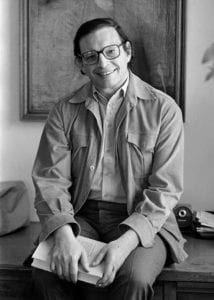by William Jordan Williamson
Current and former NYU English faculty, in addition to students, friends, and family, gathered at Fales Library on November 8th to celebrate the life and work of Dr. Kenneth Silverman, who passed away this summer at the age of 81. Dr. Silverman is survived by his daughter, Willa; his son, Ethan; his brother, Alexander; three grandchildren; and his partner, Jane Mallison.
Dr. John Maynard organized the evening, with help from Marvin Taylor at Fales, offering colleagues the opportunity to reflect on Dr. Silverman’s time at NYU. Nine friends and colleagues of his spoke, remembering both Dr. Silverman’s scholarship and his friendship, and Ms. Mallison concluded the evening with a reading of a poem.
Dr. Tom Augst, chair of the English Department, started the evening with a summation of Dr. Silverman’s life and work. Born in New York City and educated at Stuyvesant High School and Columbia, before spending 37 years in the NYU English Department and retiring in 2001, Dr. Silverman was, Dr. Augst noted, a lifelong New Yorker. Though it must have been a challenge to sum up such a wide-ranging career, Dr. Augst admirably distilled his interests and achievements. Professionally, Dr. Silverman distinguished himself as a literary biographer, an area that requires a “breadth and detail” of research, Dr. Augst said, that we might find hard to appreciate today, in an era when mass information is constantly available to us.
 Dr. Silverman wrote authoritative biographies of several key American figures, including Edgar Allan Poe, Samuel Morse, and John Cage, in addition to A Cultural History of the American Revolution. His biography of Cotton Mather, though, published in 1984, stands out even among other impressive works: it won the Pulitzer Prize in Biography or Autobiography and the Bancroft Prize for works in American history. Dr. Silverman’s career, defined by his interest in and gift for biography, Dr. Augst noted, “testifies to the literary craft of writing lives back into history.” The life of Cotton Mather, for instance, Dr. Silverman illuminated—he might have formerly been regarded as what Dr. Silverman called a “gargoyle” of American bigotry, but with the attention of biography, he stands as perhaps the “first unmistakably American figure.”
Dr. Silverman wrote authoritative biographies of several key American figures, including Edgar Allan Poe, Samuel Morse, and John Cage, in addition to A Cultural History of the American Revolution. His biography of Cotton Mather, though, published in 1984, stands out even among other impressive works: it won the Pulitzer Prize in Biography or Autobiography and the Bancroft Prize for works in American history. Dr. Silverman’s career, defined by his interest in and gift for biography, Dr. Augst noted, “testifies to the literary craft of writing lives back into history.” The life of Cotton Mather, for instance, Dr. Silverman illuminated—he might have formerly been regarded as what Dr. Silverman called a “gargoyle” of American bigotry, but with the attention of biography, he stands as perhaps the “first unmistakably American figure.”
At NYU, Dr. Silverman shared his enthusiasm for the discipline of biography through his direction of the Biography Seminar, and his passion for American literature and history as the co-director of the American Civilizations program, along with his teaching in the English Department. Several of his colleagues from the Biography Seminar spoke after Dr. Augst, in addition to colleagues in American Studies and some in the English Department who shared a friendship with him, if not a field of study. The evening was certainly not as rigorous as, for instance, The Life and times of Cotton Mather, but it was, similarly, an evocation of a life and times. Dr. Silverman’s work as a biographer was, he said, often “hard work against long odds.” For scholarly work in literary biography, Dr. Silverman’s assessment is no doubt true, but no one who spoke in remembrance of him seemed anything but glad to celebrate the life of someone who himself celebrated so many.